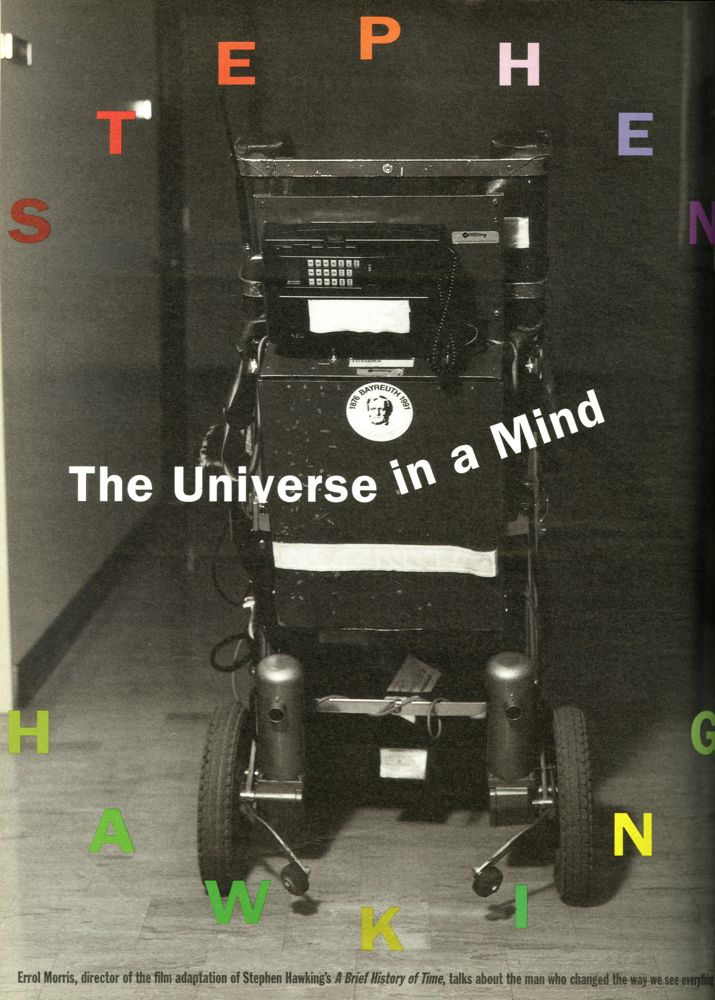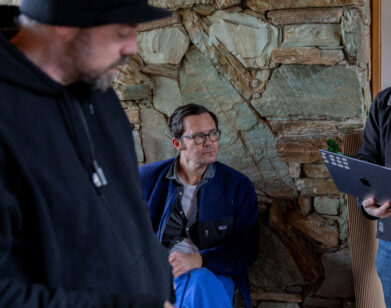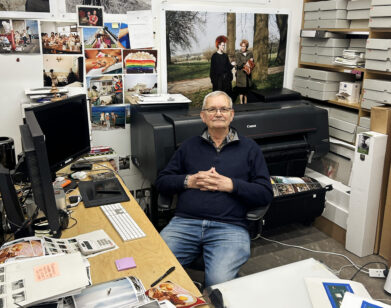New Again: Stephen Hawking
Earlier this month, The Theory of Everything, a biopic about renowned astrophysicist Stephen Hawking, opened in theaters. The film, which stars Eddie Redmayne as Hawking, begins during Hawking’s time studying cosmology at Cambridge University and cover various aspects of his life, including his sweeping romance with Jane Wilde to his devastating diagnosis of ALS, also known as Lou Gehrig’s disease, at the ripe age of 21.
The Theory of Everything recounts the extraordinary story of Hawking’s early experience with ALS through a fictionalized lens, but in 1991, soon after Hawking’s book A Brief History of Time was published, director Errol Morris made a documentary the scientist. In our September 1992 issue, Morris and film critic Gerald Peary extensively discussed what it was like to work with Hawking, his witty sense of humor, and his beliefs about god. –Christiana Tiches
Errol Morris and Stephen Hawking
By Gerald Peary
Stephen Hawking has redefined the way we look at ourselves and the universe. As a theoretical physicist, Hawking has shattered and reconstructed fundamental theories on such mind-bending matters as black holes and the nature of time, earning himself comparisons to Albert Einstein and Sir Isaac Newton.
If few have done so much to advance theoretical physics, even fewer have so effectively brought the concepts of abstract science to the general public. Stephen Hawking’s A Brief History of Time (Bantam), which traces our evolving understanding of space and time, has sold like a novel by Stephen King or Tom Clancy—more than six million copies in 30 different languages worldwide. Now director Errol Morris (The Thin Blue Line, 1988) has made the book and the story of its author into a feature film, A Brief History of Time, released this month.
As Hawking’s career has advanced, though, so has his well-known affliction—amyotrophic lateral sclerosis, or Lou Gehrig’s disease, a progressive disorder that chews away at the central nervous system. At 50, Hawking is bound to speak, unable to move, communicating only through a computer.
Hawking in the end is something of a metaphor for humanity. Let’s face it: the human body in any state of health is little more than a mass of scrambled neurons and inefficient flesh—a clumsy vehicle for thought, at best, and a poor and feeble vessel for greatness. That Hawking, in whom the physical limitations of our species are so heightened, has nonetheless achieved such greatness is a testament to the limitlessness of human potential.
Film writer Gerald Peary spoke with director Errol Morris about his collaboration with Hawking in making the documentary. –D.H.
GERALD PEARY: How did you decide to direct a film adaptation of such an unlikely work as A Brief History of Time?
ERROL MORRIS: A Los Angeles producer, Gordon Freedman, had acquired the rights to the book. Hawking and Freedman went to Steven Spielberg’s Amblin Entertainment to ask for help in making it into a movie. And they said–Kathleen Kennedy and Spielberg, that is—that even though, strictly speaking, A Brief History of Time was not an Amblin project, they would help with the financing if I decided to direct.
At that time, they didn’t know that I had a background in history and philosophy of science–that I had been a graduate student at Princeton and that John Wheeler, the man who had given black holes their name, had been one of my teachers.
I have to admit I was reluctant at first about whether I really wanted to make this movie. It had been described as an “impossible task,” and nobody had any clear idea of what it might be. I expressed interest, but it wasn’t until I met Stephen Hawking, in January 1990, that I became fully committed to the project.
PEARY: What is it like to meet with Hawking for the first time?
MORRIS: It’s very strange. On one hand, here is a person who is completely incapacitated but, on the other hand, completely in control. One feels quickly dominated by Stephen–hypersensitive, hyperaware of his presence.
There is a resemblance between a visit with Stephen Hawking and a visit to a psychiatrist. The elements of transference and projection that exist in any conversation between one person and another are heightened because of the nature of how Stephen Hawking communicates. The fact that so little is said by him in the course of an hour, two hours, three hours…
PEARY: And yet he’s communicating all the time.
MORRIS: It takes him a long time to put together a sentence. He doesn’t speak in the traditional sense. Instead he uses a synthetic voice and a computer program. He can use three fingers on each hand, with which he operates a clicker that controls a cursor on a computer screen. With the cursor, he picks out words from a dictionary or, if the word isn’t in the dictionary, individual letters, and then assembles them on the screen. And then the sentences are spoken using his speech synthesizer. It is a long, laborious process.
PEARY: All the while you’re sitting across from him.
MORRIS: And you can’t see his screen. And so there are long periods of time where Stephen is writing. You hear this clicking—click, click, click, click, click—and you have no idea what he’s writing or what he’s thinking. You have no idea whether you’re supposed to say something or say nothing. And long periods of time elapse—two, three, four minutes of silence, which is a lot of silence. And then Stephen speaks.
After a certain amount of time, you easily understand what he’s saying. It becomes his voice. But at first there is this element of surprise. You’re never really sure when he’s going to start talking, and you’re never completely sure whether you’ve heard what he’s said correctly. And then there’s the psychiatric element.
PEARY: You start getting paranoid?
MORRIS: You start thinking, Is this question ridiculous? Should I even have asked this question? Am I annoying Stephen? Does Stephen like me? Does Stephen want to be involved in this project? Am I imposing on Stephen?
As I got to know him better, instead of sitting across from him I sat next to him, so I could actually read the screen as he wrote. I became a game of 20 questions: you see the beginning of the sentence, but you’re not sure how it’s going to end—whether he’s going to put a negative in it at some point, changing its entire meaning. Still, when you’re sitting next to him, you become involved in the communication process in a more immediate sense. You feel part of it. And there is a strange intimacy about it.
PEARY: Do you like him?
MORRIS: Oh, I like Stephen very much. He has a strange and ironic presence. And he has an extraordinary sense of humor. A perverse sense of humor.
PEARY: For example.
MORRIS: Very early in the shooting, I asked him about the cosmic censorship hypothesis—the hypothesis that there are no “naked singularities,” that you can never see inside a black hole. Physicists assume that it is true, but no one has been able to prove it. So I asked him, “Well, what if the cosmic hypothesis were false? What would we see?” There was this very, very long pause and clicking while I waited for an answer. And I assumed it was a stupid question. And finally Stephen said, “Seven leather-bound volumes of Proust.”
PEARY: Was it a stupid question?
MORRIS: I guess I’ll ever know.
PEARY: Is he always so wry?
MORRIS: I shot in a studio, but the studio set closely resembles Stephen’s actual office in Cambridge, down to the books on the walls, the computer, the desk, and the Marilyn Monroe posters. Those posters are on Stephen’s wall. I remember one occasion when we hadn’t nailed the Marilyn poster to the wall, and it fell off during the shooting. It fell to the floor, and Stephen started clicking. “A fallen women,” he said.
PEARY: Hawking is funny.
MORRIS: Stephen is very, very, very funny.
PEARY: I wonder if he was amused by how many people ran out to buy A Brief History of Time but couldn’t make it through the science of it.
MORRIS: A Brief History of Time is not light reading. What I’m struck by is, the book is literature, not just simply science exposition. I think that Stephen has an unmistakable style, a romantic style: the images, his descriptions of black holes as that “ultimate prison” or “the land from which no traveler returns…”
PEARY: Isn’t that from Hamlet?
MORRIS: Stephen is extremely well read. He certainly knows the Bible, although he told me that the main thing he learned from reading the King James version was not to begin a sentence with the word “and.” He is also very much interested in Wagner, and I mentioned to Stephen that there is this passage in Parsifal, the entrance into the hall of the Grail where Guremanz says to Parsifal: “Here, time becomes space.” It’s an idea that Stephen speaks about in his “No Boundary” proposal, which makes uses of the concept of imaginary time. [In a mathematical sense, when the universe is described in imaginary time, time becomes like space.] I asked him whether he was aware of this passage in Parsifal. He said yes.
PEARY: Good answer.
MORRIS: I also told him that I asked Philip Glass to think of Parsifal and the story of the Grail while writing the music for the movie. Maybe there was some loose metaphorical connection between the riddle of our own mortality and the riddle of the universe. When I told Stephen this, he said, “If I hear a number of Dresden amens in the soundtrack, I will know why.”
PEARY: Does Hawking know everything under the sun?
MORRIS: One thing I hoped to do with this movie was to show Stephen not as a saint but as a hardworking scientist. I didn’t want to be involved in some species of hagiography.
Stephen is obviously a very complicated person and I don’t profess to know him all that well. But I think he’s a person of remarkable courage. I’m capable of being cynical about almost anything. But I found it very, very difficult to be cynical about Stephen. If anybody is a hero, it is Stephen Hawking.
PEARY: How did he participate in the filmmaking process, beyond being filmed and interviewed?
MORRIS: I would send Stephen rough cuts of the film on videotape and he would send faxes back with detailed commentary. He came over to Cambridge, Massachusetts, where I live—he calls it pseudo-Cambridge—to view one of the rough cuts and to help with the editing. And he sat in my editing room and made extensive comments on the rough cut, wrote additional narration for the movie, and provided all kinds of assistance. In fact, his trip to Cambridge was the turning point in editing the movie. Stephen told me a number of stories, the story of his near-fatal accident, when his wheelchair was hit by a taxi in 1991. He wrote bits and pieces of narration, including the story of how Roger Pennrose called him on his birthday following the discovery—Stephen Hawking’s most important discovery—of Hawking radiation, and kept him on the phone so long that his dinner got cold.
There’s one aphorism that I like, in a scientific paper of his that does not appear in the book. Einstein’s famous remark about quantum mechanics—that “God does not place dice”—and Stephen’s rejoinder: “Not only does God play dice, he sometimes throws them where they can’t be seen.”
PEARY: Is Hawking religious?
MORRIS: I’ve been to a whole number of public lectures that Stephen has given, and one of the questions that he’s invariably asked is, “Do you believe in God?” And his answer has always been, “I do not believe in a personal God.” Notwithstanding, A Brief History of Time is filled with references to God–the question of the nature of God, the role of God in the universe, the question of the First Cause. How did the universe start off? Or did the universe begin somehow by itself? Yes, God, and First Cause, and the Creator all appear again and again and again–
PEARY: Including the last line of the book, refrained as the last line of the movie–
MORRIS: Where Stephen talks about knowing the mind of God. One thing I tried to capture as the very end of the movie, something I think is very much part of the way Stephen Hawking talks about the world, is this combination of amazing optimism and amazing pessimism. Stephen talks about the possibility that we may know everything there is to know about the world around us, that we may know the mind of God, the deepest secrets of the universe. On the other hand, he talks about how the universe may just simply come to an end–that 15 billion years from now, it may all go down the tubes.
Stephen has told me, in fact, one of the most pessimistic stories I have ever heard. In response to the question, “Is there extraterrestrial life, is there life out there? And if so, why haven’t we found any evidence of it? Why haven’t we heard intelligent signals from outer space?” Stephen’s answer was, “Think of our DNA. In the last million years, our DNA hasn’t changed at all. It’s really much the same as it was in the jungle, a million, two millions years ago. But in the last 200 years, our destructive capacities have increased many, many millions of times over. Why don’t we see intelligent signals from outer space? Because in all likelihood, once the civilization reaches the point our civilization has reached, it destroys itself.”
PEARY: Is there anything about your film that Hawking doesn’t like?
MORRIS: He was always opposed to the chicken at the very beginning of the movie. But it was something I was quite adamant about, simply because I felt it was the first and only opportunity I would have to put a chicken in the stars, and I thought I should avail myself of the opportunity while I had the chance.
PEARY: What was Hawking’s most immediate pleasure on seeing the film?
MORRIS: He thanked me for making his mother into a movie star.
THIS INTERVIEW ORIGINALLY RAN IN THE SEPTEMBER 1992 ISSUE OF INTERVIEW.
New Again runs every Wednesday. For more, click here.







